- Home
- Rosamunde Pilcher
Sleeping Tiger Page 2
Sleeping Tiger Read online
Page 2
“I could have told you that,” said her father.
“Why haven’t they got a smell?”
“I haven’t any idea.”
“I thought all flowers had a smell.”
“Most of them do. Come along now.”
“Can I pick them?”
“I shouldn’t.”
“Why not?”
“The park men don’t like it.”
“Why not?”
“It’s a rule.”
“Why?”
“Well, other people like to look at them. Come along now.”
The little girl came, clambered back on to her trike and pedalled off down the path, her father behind her.
Selina watched this small scene, torn between pleasure and wistfulness. All her life she had listened in on the lives and conversations of other families, other children, other parents. Their attitudes towards each other caused her endless speculation. As a child, taken to the park by Agnes, her Nanny, she had always hung shyly about at the edge of other people’s games, longing to be invited to join in, but too timid to ask. It was not very often that she was invited. Her clothes were always too tidy, and Agnes, sitting knitting on a nearby bench, could look very forbidding. If she thought there was a danger of Selina becoming embroiled with a set of children whom old Mrs. Bruce would obviously consider “unsuitable,” then Agnes would roll up her ball of wool, spear it with needles, and announce that it was time to walk back to Queen’s Gate.
Here, they were a household of women—a small feminine world, ruled by Mrs. Bruce. Agnes, who had once been her maid, and Mrs. Hopkins, the cook, and Selina, were all her obedient subjects, and a man, unless it was Mr. Arthurstone, Grandmother’s lawyer, or, in more recent years, Rodney Ackland, representing Mr. Arthurstone, had scarcely ever entered the house. When one did—to mend a pipe, do a bit of painting, or read the meter—Selina was invariably found in his company, asking questions. Was he married? Did he have children? What were the children called? Where did they go for their holidays? It was one of the few things that made Agnes cross.
“What on earth would your grandmother say if she could hear you at it—keeping the man from his work?”
“I wasn’t.” On occasions Selina could be stubborn.
“What do you want to talk to him for?”
She could not answer because she did not understand why it was so important. But nobody would talk about her father. His name was never mentioned. Selina did not even know what he had been called, for Mrs. Bruce was her mother’s mother and Selina had taken her name.
Once, indignant on some score, she had asked outright, “I want to know where my father is. Why haven’t I got one? Everybody else has.”
She had been told, coldly, but quite kindly, that he was dead.
Selina was taken regularly to Sunday school. “Do you mean he’s gone to heaven?”
Mrs. Bruce had tugged at a tiresome knot in her tapestry wool. The idea of That Man consorting with the angels she found hard to swallow, but her religious discipline was strong and it would be wrong to disillusion the child.
“Yes,” she said.
“What happened to him?”
“He was killed in the war.”
“How killed? How was he killed?” (She could imagine nothing more horrifying than being run over by a bus.)
“We never knew, Selina. We really can’t tell you. Now—” Mrs. Bruce glanced at her watch with an air that indicated the conversation was closed. “Go and tell Agnes it’s time for your walk.”
Agnes, when tackled, proved a little more forthcoming.
“Agnes, my father’s dead.”
“Yes,” said Agnes. “I know.”
“How long has he been dead?”
“Since the war. Since nineteen forty-five.”
“Did he ever see me?”
“No. He died before you were born.”
This was discouraging.
“Did you ever see him, Agnes?”
“Yes,” said Agnes reluctantly. “When your mother was engaged to him.”
“What was his name, Agnes?”
“Now that, I cannot tell you. I promised your grandmother. She doesn’t want you to know.”
“Well, was he nice? Was he good-looking? What colour was his hair? How old was he? Did you like him?”
Agnes, who was also highly-principled, answered the one question that she could answer truthfully.
“He was very good-looking. Now, I think that’s enough. Hurry along, Selina, and don’t drag your feet; you’ll scuff the toes of your new shoes.”
“I’d like to have a father,” said Selina, and later that afternoon spent half-an-hour or more standing watching a father and son sail their model yacht on the Round Pond, edging nearer and nearer all the time in the hope of listening in to their conversation.
* * *
She found the photograph when she was fifteen. It was a depressing, wet London Wednesday. There was nothing to do. Agnes had her day off, Mrs. Hopkins was sitting with her arthritic legs on a footstool, immersed in the People’s Friend. Grandmother had a bridge party. Muted voices and the smell of expensive cigarettes stole from behind the closed drawing-room doors. Nothing to do! Selina, prowling restlessly, came into the spare bedroom, looked at the view from the window, made a few film-star faces into the triple mirror, and was just on the way out when she noticed the books in the small cupboard between the two beds. It occurred to her that she might perhaps find a book she had never read, and with this idea in mind she went to kneel between the beds and run her forefinger along the titles.
It stayed still at Rebecca. A yellow-jacketed war-time edition. She took it out and opened it, and a photograph fell from the closely-printed pages. A photograph of a man. Selina picked it up. A man in uniform. Very dark-haired, with a cleft in his chin, his eyebrows irregular, his black eyes glinting with laughter although his face was set in suitable solemn lines. He was a soldier, tailored and well-buttoned, with a glimpse of gleaming Sam Browne across one shoulder.
There was the beginning of a wonderful suspicion. Somewhere, behind the dark amused face, was a suggestion of Selina’s own. She took the photograph to the mirror, trying to find resemblances in the planes of her face, the way her hair grew, the squared-off corners of her chin. There wasn’t much to go on. He was very handsome, and Selina was plain. His ears lay neatly against his head, and Selina’s stuck out like jug-handles.
She turned the photograph over. On the back was written:
Harriet, darling,
from G.
and a couple of crosses for kisses.
Harriet had been her mother’s name, and Selina knew then that the photograph was of her father.
She never told anybody about it. She slid Rebecca back into the shelf, and took the photograph into her room. After that, she carried it everywhere with her, wrapped in thin paper to keep it clean and crisp. She felt now that she had, at least, a root, however, tenuous, but it still didn’t fill her need, and she still watched other families, and still listened in to other people’s conversations.…
* * *
A child’s voice penetrated her thoughts. Selina had been dreaming in the sun. Now, awakened, she was aware of the endless roar of Piccadilly traffic, car horns, and the high-pitched chatter of a baby girl, sitting in a pushchair. The other little girl on the tricycle and her father had long since disappeared. Other groups had taken their place, and a loving couple lay, entwined with complete abandon, only a few yards from where Selina sat.
The wooden chair had grown uncomfortable. Selina shifted her position slightly, and the parcel that Rodney had given her slid off her lap and fell on to the grass. Stooping, she picked it up, and aimlessly, without a thought, began to undo it. The dust-jacket of the book was in glossy-white with the lettering in red:
FIESTA AT CALA FUERTE
by George Dyer
Selina turned down the corners of her mouth. The book seemed very heavy. She riffled its pages and then clos
ed it, as though she had already finished reading it, with the back of the book lying upwards on her knee.
The face leapt at her, as a name does, suddenly out of a column of newspaper print. It was a casual photograph, blown up to fill the space on the back of the jacket. George Dyer. He wore a white open-necked shirt, and his skin, in contrast, was dark as leather. His face was seamed with lines, they splayed from the corners of his eyes, drew deep channels from nose to mouth, furrowed his brow.
But still, it was the same face. He hadn’t changed so much. The cleft was there in the chin. The neat ears, the light in his eye, as though he and the photographer were sharing some outrageous joke.
George Dyer. The author. The man lived on an island in the Mediterranean and wrote about the inhabitants with such balance and sanity. That was his name. George Dyer. Selina picked up her bag, took out the photograph of her father, and, with hands that trembled, held the two photographs alongside each other.
George Dyer. And he had published a book. And he was alive.
2
She took a taxi back to Queen’s Gate, ran up the stairs, burst into the flat and called for Agnes.
“I’m here, in the kitchen,” Agnes replied.
She was making tea. As Selina appeared in the open kitchen door, Agnes, spooning tea into the pot, looked up. She was a small, ageless person, her slightly sour expression a defence against the tragedies of life, for she had the kindest heart in the world, and she could scarcely bear to hear of hardship or sadness which she was unable to relieve. “Those poor Algerians,” she would say, putting on a hat in order to go out and buy a postal order, probably for more than she could afford, and during the Freedom from Hunger campaign she had done without lunch for seven days on end, and suffered cruelly from the resultant tiredness and indigestion.
The lease of the Queen’s Gate flat had already been sold, and when Rodney and Selina were married and moved into their new house, Agnes was going with them. It had taken some time to make her agree to this. Surely Selina wouldn’t want old Agnes under her feet … she would want a fresh start on her own. Selina had managed to assure Agnes that nothing was further from her mind. Well, Mr. Ackland, then, Agnes argued; heavens, it would be like having his mother-in-law come to live! Rodney, primed by Selina, talked Agnes out of this one. Then she said she didn’t like the idea of moving, she was too old to move, so they took her to see the new flat, and she was charmed, as they had known she would be, by the brightness and convenience of it all, the American kitchen filled with sunlight, and the small sitting-room which would be Agnes’s own, with a view of the park, and her own telly. After all, she told herself stoutly, she was going with them to help. She was going to work. And, in time, no doubt she would become a Nanny again, with a new nursery to rule, and another generation of babies, an idea that stirred anew all her latent mothering instincts.
Now she said, “You’re back early. I thought you were going to go and measure the floors.” Selina stood in the door, pink-cheeked from running upstairs, and her blue eyes bright as glass. Agnes frowned. “Is anything wrong, dear?”
Selina stepped forward and laid a book on the scrubbed table between them. She said, looking Agnes straight in the eye, “Have you ever seen that man before?”
Agnes, alarmed, let her gaze slowly drop to the book on the table. Her reaction was more than satisfactory. She gave a small gasp, dropped the caddy spoon, and sat down suddenly on a blue painted chair. Selina half-expected her to place a hand over her heart. She leaned forward across the table. “Have you, Agnes?”
“Oh,” said Agnes. “Oh, what a turn you gave me!”
Selina was relentless. “You have seen him before, haven’t you?”
“Oh, Selina … where did you … How did you know … When did you…” She was incapable of framing a single question or finishing a single sentence. Selina pulled up a second chair and sat facing her across the table.
“It’s my father, isn’t it?” Agnes looked as though she was about to cry. “Is that his name? George Dyer? Was that my father’s name?”
Agnes pulled herself together. “No,” she said. “No, it wasn’t.”
Selina looked rebuffed. “Well, what was it?”
“It was Gerry … Dawson.”
“Gerry Dawson. G. D. The same initials. The same face. It’s a pen-name. It’s obvious; it’s a pen-name.”
“But, Selina … your father was killed.”
“When?”
“Just after D-day. Just after the invasion of France.”
“How do we know he was killed? Was he blown up in front of an eye-witness? Did he die in somebody’s arms? Do we know he’s dead?”
Agnes ran her tongue over her lips. “He was missing. Presumed killed.”
Hope leapt anew. “Then we don’t know.”
“We waited three years, and then he was presumed killed. They let your grandmother know, because Harriet … well, you know. She died when you were born.”
“Didn’t my father have any family?”
“None that we knew of. That was one of the things your grandmother objected to. She said he was without background. Harriet met him at a party; she was never properly introduced, the way your grandmother would have liked.”
“For heaven’s sake, Agnes, there was a war on! It had been going on for five years. Hadn’t Grandmother noticed?”
“Well, maybe, but she had her standards and her principles and she stuck by them. There’s nothing wrong in that.”
“Never mind about it. My mother fell in love with him.”
“Hopelessly,” said Agnes.
“And they got married.”
“Without Mrs. Bruce’s consent.”
“And did she forgive Harriet?”
“Oh, yes, she was never one to hold a grudge. And, anyway, Harriet came back to live here. You see, your father was sent … well, in those days they called it Somewhere in England. But he was sent to France … on D-Day-plus two, it was. He was killed soon after. We never saw him again.”
“So they were married for…”
“Three weeks.” Agnes swallowed the lump in her throat. “But they had a honeymoon, and they were together for a little while.”
“And my mother was pregnant,” said Selina. Agnes looked at her in a shocked silence. She still did not expect Selina to use such words, or even to know about such things.
“Well, yes.” The face on the back of the dust-jacket caught her eye, and she straightened the book neatly, watching the wicked light in the dark eyes. Brown, they’d been. Gerry Dawson. Was it really Gerry Dawson? It certainly looked like him, or at least the way he would look now if he hadn’t been killed, like that, so young and so handsome.
Memories came nudging back and they were not all of them bad. He had given Harriet a glow and a vitality that Agnes had not known she could possess. With Agnes he had flirted mildly, slid her a pound note when nobody was looking. Nothing for Agnes to be proud of to be sure, but it had been a bit of fun, just the same. A bit of fun when life was singularly unfunny. A masculine wind blowing through the house of women. Only Mrs. Bruce had held out against his charm.
“He’s a waster,” she had announced. “You can tell. Who is he? What is he? Take away the uniform and you’re left with a handsome drifter. No sense of responsibility. No thought for the future. What sort of a life can he offer Harriet?”
Of course, in a way, she was jealous. She liked to order people’s lives, to keep a tight rein on the way they behaved, and the money they spent. She had meant to choose, herself, a husband for Harriet. But Gerry Dawson, for all his charm, had a personality and a determination to match her own, and he had won the battle.
Afterwards, after he was dead, after Harriet, not wanting to live, had died, Mrs. Bruce said to Agnes, “I am going to change the baby’s name from Dawson to Bruce. I’ve already spoken to Mr. Arthurstone about it. It seems the obvious thing to do.”
Agnes did not agree. But she had never been one to argue with Mrs. Bru
ce. “Yes, madam,” she had said.
“And, Agnes, I would rather she grew up not knowing about her father. It can do her no good, and it might make her feel very insecure. I trust you, Agnes, not to let me down.” She held the baby on her knee, and she had raised her eyes, and the two women had watched each other over the fluffy head of the baby.
After a little pause, Agnes had said, again, “Yes, madam,” and was rewarded with a brief, cold smile. Mrs. Bruce lifted Selina and placed her in Agnes’s arms. “I feel much happier now,” she said. “Thank you, Agnes.”
* * *
Selina said, “You think it’s my father, don’t you?”
“I don’t know for sure, Selina, and that’s the truth.”
“Why wouldn’t you ever tell me what his name was?”
“I promised your grandmother that I wouldn’t. Now, I’ve broken my promise.”
“You didn’t have any choice.”
A thought struck Agnes. “How do you know what he looked like?”
“I found a photograph, ages ago. I never told any of you.”
“You’re not going to do—do anything.” Agnes’s voice trembled at the very thought.
“I could find him,” said Selina.
“What good would it do? Even if it was your father.”
“I know it’s my father. I just know it is. Everything points that way. Everything you’ve told me. Everything you’ve said.…”
“If it is, then why didn’t he come back to Harriet, after the war?”
“How do we know? Perhaps he was wounded, lost his memory. These things happened, you know.” Agnes was silent. “Perhaps my grandmother was so horrid to him…”
“No,” said Agnes. “That would never have made any difference. Not to Mr. Dawson.”
“He’d want to know he had a daughter. That he had me. And I want to know about him. I want to know what he’s like and how he talks and what he thinks and does. I want to feel I belong to someone. You don’t know how it is, never really belonging to anybody.”

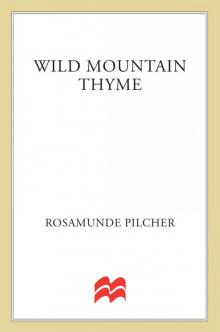 Wild Mountain Thyme
Wild Mountain Thyme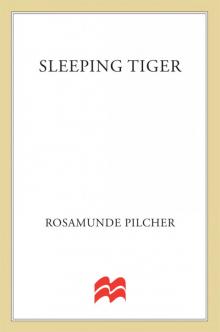 Sleeping Tiger
Sleeping Tiger Flowers in the Rain & Other Stories
Flowers in the Rain & Other Stories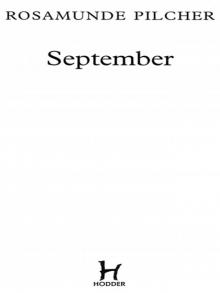 September
September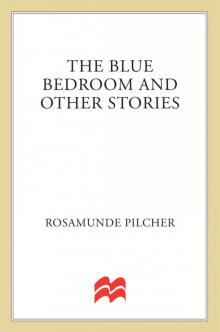 The Blue Bedroom: & Other Stories
The Blue Bedroom: & Other Stories The Carousel
The Carousel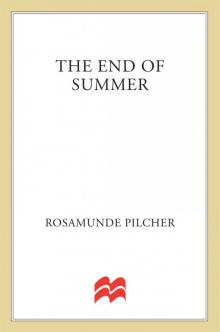 The End of Summer
The End of Summer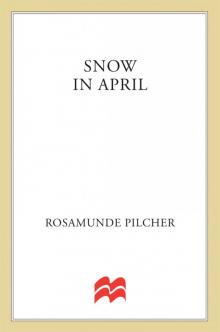 Snow in April
Snow in April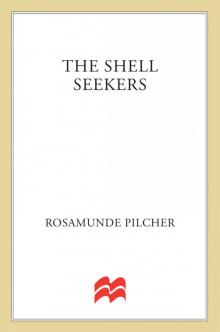 The Shell Seekers
The Shell Seekers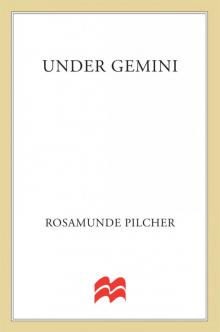 Under Gemini
Under Gemini The Empty House
The Empty House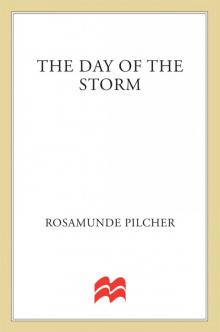 The Day of the Storm
The Day of the Storm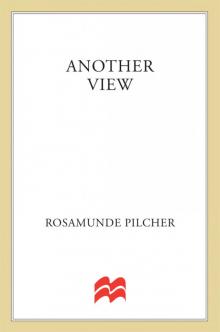 Another View
Another View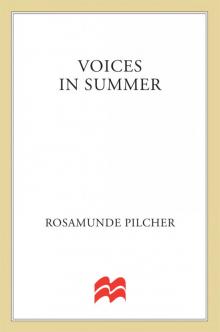 Voices in the Summer
Voices in the Summer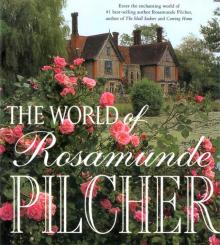 The World of Rosamunde Pilcher
The World of Rosamunde Pilcher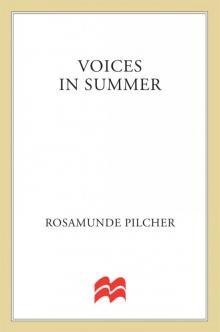 Voices In Summer
Voices In Summer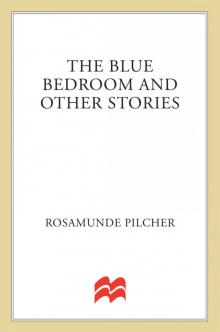 Blue Bedroom and Other Stories
Blue Bedroom and Other Stories